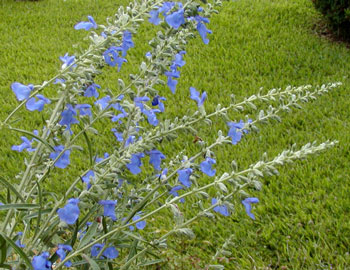Pitcher Sage, Prairie Sage
Salvia azurea
…for late season spires of baby blue blooms<

Design Tip: The clear color would add vertical accent to a classical blue, white and yellow border palette along with multiple clumps of whiteSalvia greggii, blue Salvia farinacea 'Victoria', blue Cape plumbago, yellow Lantana and Verbesium cowpen daisy.
Form: Native to Southeastern U.S. including East Texas, the clump-forming perennial returns each spring from a durable rhizomatous rootsock.
Flowers: Loose spikes of clear-azure blue, some with a touch of white, appear in August, continuing until first frost.
Size: First season plantings may remain a tidy two or three foot height, although mature plants tend to grow tall and leggy, requiring staking if not sheared near to the ground in early summer.
Soil: It tolerates a wide range of sand, loam or clay soils within pH levels from 6 to 8.5. Good drainage is required in heavy soils.
Water: Young plants require rainy spring weather or irrigation in the first year, after which, a long taproot provides drought tolerance.
Light Exposure: Native to tall-grass prairie and woodland regions demonstrates its acceptance of either full sun or partial shade.
Hardiness: It is root hardy in USDA Zones 7B to 9A.
Grooming: First year plants require no trimming. In the second year, cut stems near to the ground in early summer to promote branching or trim it back to just a few leaves in mid summer to avoid staking. Summer trimmings produce a shorter plant with more flowering stems. If a lanky plant does fall sideways, its bloom spires will still grow erect, but the laying over will smother less robust plants underneath.
Propagation: Seeds can be sown in spring, but fall-blooming plants will provide self-sown seedlings in spring.
Snippets: The Salvia azurea var. grandiflora variety is the most commonly cultivated and there is a more rare white-flowered form.
Cultivated, photographed and written by
Maggie Ross McNeely in Ft. Worth, Texas
All rights reserved